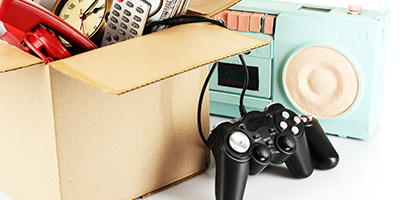How to Help Someone With a Hoarding Disorder Clean Their House

How to Help Someone With a Hoarding Disorder
Hoarding is a psychological disorder that makes it challenging to throw anything away. If you have a loved one with hoarding tendencies, it’s difficult to know where to start and how to help them clean their home. Before helping a hoarder get rid of things, it’s important to learn more about the disorder and seek out professional help for them.
How to Address Hoarding and Find Professional Help
Identifying Hoarding Behaviors
Hoarding is a serious condition that can have emotional, social, financial and even physical effects on a person. Behaviors and signs of compulsive hoarding include:
- Avoiding throwing away possessions that have no value to yourself or anyone else.
- Experiencing mild to severe anxiety about getting rid of anything.
- Repeatedly adding to the hoard without recognizing there is a problem.
- Rooms in the home that can no longer be used for their intended purpose due to clutter.
- An abundance of possessions that negatively impact one’s safety, health or hygiene.
Hoarding tendencies can vary in severity, but if you recognize more than one of these situations with your loved one, it’s important to seek professional assistance before moving forward.
The International OCD Foundation can help you find a local therapist who specializes in hoarding disorders.
If the situation you’re dealing with is less extreme but you still have a lot of clutter to deal with, head to our ridiculously thorough declutter guide for professional room-by-room organizing tips.
Seeking Professional Assistance
Once you’ve connected your loved one with a mental health professional to address the underlying issues behind their hoarding tendencies, you can focus on helping them declutter and clean.
Gauge the severity of the situation and how many people will be able to help with the cleanup. Also consider your loved one’s personal progress – can you manage the hoarding location without a professional organizer, or do you need help from an expert?
“A trained professional organizer with hands-on experience working with large amounts of clutter will be able to provide sorting and organizing help, as well as be able to provide structure to the cleanout process,” shares Rachel Seavey, Professional Organizer at Collector Care.

"If your loved one has been categorized as level three or higher on the Institute for Challenging Disorganization’s Clutter-Hoarding Scale, you should work with an organizing professional who specializes in the disorder as well as a trained health professional to improve the living conditions."
Rachel Sager, Professional Organizer Restart with Rachel
Help a Hoarder Clean and Organize Their Home in 4 Steps
1. Ease Into Conversation About Decluttering and Cleaning
The first step in helping a hoarder clean their house is to start a conversation. When talking about your plans to help, emphasize the ideas of safety and confidentiality. Discuss how decluttering will make their home safer to live in, and communicate that you’re only there for support, not to judge. It’s important to involve their mental health professional in these conversations as well.

“One of the most important tips for working with someone challenged with hoarding is to meet them where they are at. They are the owners of their stuff; they are the ones in charge of the process. Talk with the person to understand how [the items they are keeping] meet their end goal, whatever their end goal may be.”
Rachel Sager, Professional Organizer Restart with Rachel
While easing into conversations, you should always use neutral language. “Words like ‘clutter’ or ‘unsanitary’ can trigger [someone], and cause them to become defensive. Using neutral, non-threatening language allows you and [your loved one] to communicate freely without pointing fingers,” says Maeve Richmond, founder and coach at Maeve’s Method.

2. Make a Plan for Managing the Hoarding Location
Once all parties involved have agreed that it’s time to start cleaning the hoarder’s home, you’ll need to create an action plan. Work with your loved one to draft a strategy they approve of and are ready to attempt. Here are a few tips to keep in mind when helping a hoarder plan to get rid of things:
Determine the Criteria for Getting Rid of Items
Sit down with your loved one and help them create a list of criteria to apply to each item when deciding if it can be thrown away. Remember that these are their belongings, and they are ultimately in charge of the process. Write down the criteria as you discuss them, so everyone who’s assisting can refer to the list as needed. One example is, “All mail older than six months can be thrown away.”
Make a Schedule
Tackling rooms individually is the most manageable way to help a hoarder clean their house. Decide in which order you’ll handle the rooms and how much time you’ll be able to dedicate to each space.
Set Goals
Setting objectives is essential when helping someone with hoarding tendencies. To keep everyone motivated, make concrete and attainable goals. Examples include clearing space in entrances and hallways to improve accessibility, clearing an area where they’d feel comfortable hosting company, or organizing items and moving them to a storage area.

“It’s really about managing expectations. If you’re going to DIY it, you need to go in with correct expectations. It’s not about fixing the person. It’s about buying time for you both to improve the situation temporarily.”
Maeve Richmond, Founder and Coach Maeve’s Method
3. Start Decluttering and Organizing Room-By-Room
With a plan in place, you’re ready for the next phase: cleaning and organizing. Professional organizer Geralin Thomas advises, “Cleaning and organizing are two different things. First declutter the home, then organize and finally, begin cleaning.”
Using your room-by-room plan and predetermined list of criteria for each item, identify and throw away clutter that doesn’t hold significant value. Then, create separate piles for items to keep and items to donate.
Helping a loved one with a hoarding disorder is both incredibly challenging and emotionally exhausting. Remember to stay positive and be patient, especially when decluttering items that have sentimental value. Take frequent breaks throughout the process, and continue to have encouraging conversations about how each step is helping you meet the end goal.
4. Develop a Strategy for Waste Removal
When you’re helping a hoarder clean their house, you will likely end up with a lot of things to throw away. To keep the cleanout moving forward, it’s important to have a fast and simple solution for getting rid of trash as you clear out each room in the home.
Renting a dumpster is a convenient option for projects of this size. You can take your time filling the container as you work and have it removed as soon as you’re done. Other waste removal options include waiting for the city’s curbside bulk pickup, which can add significant time to the cleanout, and hiring a junk removal service, which can quickly get expensive if you have a lot of debris. Keep in mind that someone with a hoarding disorder may be tempted to remove items from your debris pile if left unattended.

“Working with a hoarder and helping them to live better in their space is really about not fixing the problem but is to find some kind of happy medium where you can make yourself feel better and alleviate the situation while also understanding that the room you cleared out might not last for very long. The solutions you created may not be long term.”
Maeve Richmond, Founder and Coach Maeve’s Method
Remember That Decluttering is a Journey
Decluttering can be an emotional and time-consuming process, especially in serious situations like this. But getting organized is beneficial for so many reasons. When you help a hoarder clean their house, you’ll provide them with a sense of control and accomplishment and improve their overall quality of life.
Not sure where to start when it comes to home organization? Check out our Complete Home Decluttering Guide!


